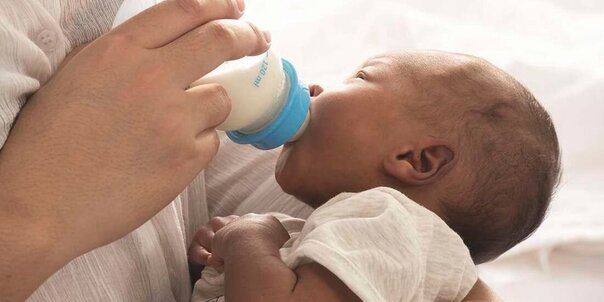Kenya cancels feeding bottles
30 March 2022 By Abiodun Giwa
 A baby being fed by a mother from a feeding bottle now under ban in Kenya. Photo (Courtesy: KenyaDailyNation).
A baby being fed by a mother from a feeding bottle now under ban in Kenya. Photo (Courtesy: KenyaDailyNation).
Kenya has banned feeding bottles. The Daily Nation newspaper reported the ban on Wednesday following an announcement by the government in Nairobi. Following the passage of the recent law Breast Milk Supplements (BMS) Regulation and Control Act of 2012. Therefore, teats, pacifiers, cups, bottles, and spouts become illegal in Kenya from May 28 as containers for baby food.
Esther Mogusu, Nairobi Metropolitan Services' principal nutrition and dialectics officer, praised the government's decision and said that feeding bottles do more harm than good to children. According to the news report, the new regulation follows an understanding that whatever is given to babies from the feeding bottles does not represent breast milk.
Mogusu said the teats the child feeds on are silicon. "It does not have the same texture as the breast nipple and causes nipple confusion, leading to refusal of breastfeeding by the baby."
She said further that the teat of feeding bottles causes misalignment of the jaw in the child because a child has to bite on it. "Bottles are not easy to clean because of the multiple grooves that hide bacteria and microorganisms, causing diarrhea and infection in the child."
However, the cancellation of baby bottles has not banned the use of infant formula but only regulates its marketing, Veronica Wanjiru Kirogo, nutrition director at the Kenya Ministry of Health, said.
Martha Ngayama, country director of Nutrition International, NI, agrees with the ban on feeding bottles. But she calls for guidelines, training, information, and alternatives to ensure compliance with the law.
She also seeks information on using a cup and spoon to replace feeding bottles.
Esther Mogusu, Nairobi Metropolitan Services' principal nutrition and dialectics officer, praised the government's decision and said that feeding bottles do more harm than good to children. According to the news report, the new regulation follows an understanding that whatever is given to babies from the feeding bottles does not represent breast milk.
Mogusu said the teats the child feeds on are silicon. "It does not have the same texture as the breast nipple and causes nipple confusion, leading to refusal of breastfeeding by the baby."
She said further that the teat of feeding bottles causes misalignment of the jaw in the child because a child has to bite on it. "Bottles are not easy to clean because of the multiple grooves that hide bacteria and microorganisms, causing diarrhea and infection in the child."
However, the cancellation of baby bottles has not banned the use of infant formula but only regulates its marketing, Veronica Wanjiru Kirogo, nutrition director at the Kenya Ministry of Health, said.
Martha Ngayama, country director of Nutrition International, NI, agrees with the ban on feeding bottles. But she calls for guidelines, training, information, and alternatives to ensure compliance with the law.
She also seeks information on using a cup and spoon to replace feeding bottles.
Comment Form is loading comments...

